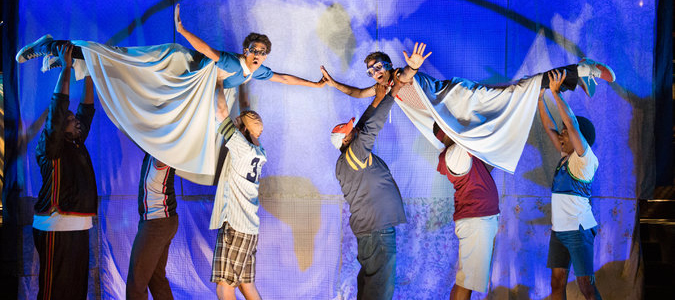

The Fortress of Solitude
Opening Night: October 22, 2014
Closing: November 16, 2014
Theater: The Public Theater
Conceived and directed by Daniel Aukin (Bad Jews, 4000 Miles), based on the acclaimed novel by Jonathan Lethem, the soaring new musical The Fortress of Solitude makes its World Premiere at The Public with a dynamite creative team including composer/lyricist Michael Friedman (Love’s Labour’s Lost, Bloody Bloody Andrew Jackson) and bookwriter Itamar Moses (Boardwalk Empire, The Four of Us). The Fortress of Solitude is the extraordinary coming-of-age story about 1970s Brooklyn and beyond — of black and white, soul and rap, block parties and blackouts, friendship and betrayal, comic books and 45s. And the story of what would happen if two teenagers obsessed with superheroes believed that maybe, just maybe, they could fly…
BUY TICKETSREAD THE REVIEWS:
October 22, 2014
The musical timeline of The Fortress of Solitude is mid-1960s to late 1980s. But the theme of this blood-pumping, heart-thumping show — the indestructible links that bind us to the old neighborhood — is timeless. The story, from Jonathan Lethem’s 2003 novel, views two boys from the same Brooklyn neighborhood who grow up as friends. At a critical moment in their lives, one leaves and the other one stays behind. Michael Friedman follows this friendship in a soaring score that keeps reinventing itself to reflect the turbulent social forces that change neighborhoods — and friends — beyond all recognition. Is there an audience for this extraordinary show? Yes. Is there a Broadway audience? Maybe not. Dylan Ebdus (a sensitive perf from Adam Chanler-Berat), an awkward white kid living in a black neighborhood of Brooklyn in the mid-1970s, feels exactly like the outsider he is. “I’m trying to find the beat,” he sings, “But the time keeps changing on me.” Dylan is 12 years old when he meets Mingus Rude (the magnetic Kyle Beltran), a black kid from the next block who is already making his name as a tagger. A friendship is forged (in the musically rapturous “Superman”) when these imaginative boys discover that they share a yearning to be superheroes with the magic power to fly up, up and away — right out of this tough neighborhood and into the quiet Fortress of Solitude where Superman goes to escape from the world.
READ THE REVIEWOctober 22, 2014
Jonathan Lethem’s bestselling 2003 coming-of-age novel, The Fortress of Solitude, has been adapted into an off-Broadway musical with only fitfully successful results. This co-production by the Dallas Theater Center and NYC’s Public Theater is uncommonly ambitious in its scope and execution and boasts plenty of talent both on and offstage. But despite the strengths of Michael Friedman’s score, which features influences including soul, doo-wop, R&B, hip-hop and rock, the sprawling narrative never comes into clear focus. With a multitude of characters and a story that sprawls across two decades, the material doesn’t quite cohere into a satisfying whole. The first part is set in ’70s era, pre-gentrification Brooklyn and centers on the relationship between two teens named after musical icons: the white, Jewish, nerdy Dylan (Adam Chanler-Berat), son of an artist father (Ken Barnett) and social activist mother (Kristen Sieh) who abandons her family; and the black Mingus (Kyle Betran). The latter’s father is Barrett Rude Junior (Kevin Mambo), a cocaine-addicted former soul singer who years earlier briefly hit second-tier stardom as lead singer of the group the Subtle Distinctions.
READ THE REVIEWOctober 22, 2014
The Fortress of Solitude relies so much on musical pastiche that at times it feels like an old K-Tel commercial, this one pitching “The Super Hits of ’80s New York.” You can almost picture band names scrolling down — the Ramones, Talking Heads, Run-DMC — as Michael Friedman’s new songs play out. But a musical valentine to a lost era doesn’t necessarily make an emotionally involving show. Based on Jonathan Lethem’s semi-autobiographical novel of the same name, Fortress beams us back to the Brooklyn of the late ’70s and early ’80s. The area now known as Boerum Hill was Gowanus back then, and predominantly black. So when young, white Dylan Ebdus (Adam Chanler-Berat) moves in, he’s a bully magnet — until his neighbor Mingus Rude (Kyle Beltran) takes him under his wing. The two 12-year-olds like the same comics and music. Dylan’s especially fascinated by Mingus’ dad, Barrett Rude Jr. (Kevin Mambo), a former member of a vocal group called the Subtle Distinctions.
READ THE REVIEWOctober 22, 2014
Musical theater is not a form that gravitates toward the novel. Credit and respect are therefore due to Itamar Moses and Michael Friedman’s The Fortress of Solitude, which is not only based on a substantial work of literature—Jonathan Lethem’s 500-page 2003 best-seller about a pair of childhood friends in Brooklyn, white Dylan (the baby-faced Chanler-Berat) and black Mingus (the sweet-voiced Beltran)—but also takes the genre in brave new directions. Not that it avoids nostalgia: Our relationship to the past, and its presence in our lives, is one of the musical’s central concerns, and Friedman’s score draws excitingly on period sounds, especially 1970s soul. But history, in this telling, resists being embraced. It disappears, like Dylan’s flaky mother (Kristen Sieh), leaving you wanting more, or it hangs around, like his artist father (Ken Barnett), but doesn’t quite connect.
READ THE REVIEWOctober 22, 2014
For a novel that featured a magic ring that allowed teenagers to fly and turn invisible, Jonathan Lethem’s The Fortress of Solitude felt uncannily true to life. This 2003 chronicle of a Jewish boy growing up in a largely African-American Brooklyn neighborhood understood that nothing is ever as simple as black and white. It’s appropriate that the R&B group that formed part of the soundtrack of the coming-of-age of Mr. Lethem’s ambivalent hero was called the Subtle Distinctions. Whether the subject was music, comic books, graffiti, absent parents or experimental sex, the fine differences in their forms — and our narrator’s painful consciousness of them — made the book an especially authentic-tasting brew. The Subtle Distinctions surface again in the big-hearted but thin-blooded musical adaptation of The Fortress of Solitude, which opened Wednesday night at the Public Theater. I’m referring exclusively to the musical quartet. Subtle distinctions, without the capital letters, are rarely in evidence in this production, which features a book by Itamar Moses and songs by Michael Friedman. Directed by Daniel Aukin, who also conceived the show, this Fortress operates mostly on an either-or binary system, as opposed to the more multistranded approach taken by Mr. Lethem. Parallels, contrasts and conflicts are laid out neatly.
READ THE REVIEW























